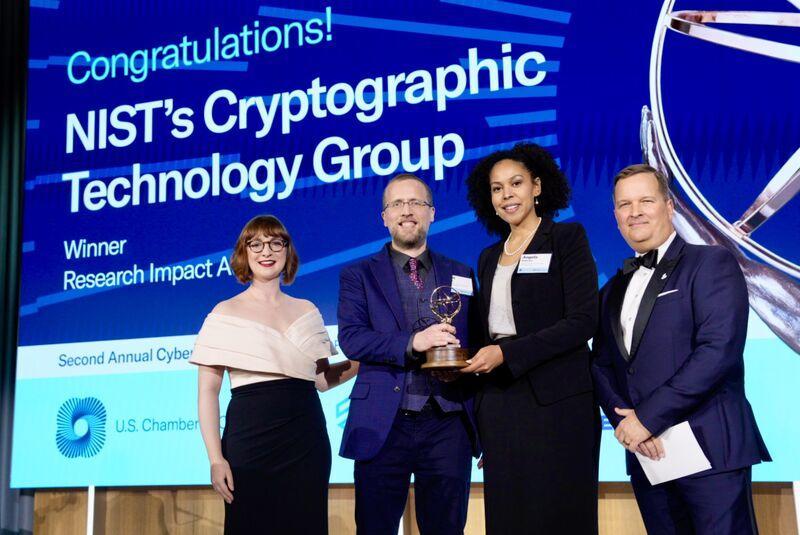
A trio of researchers active in the Joint Center for Quantum Information and Computer Science (QuICS) were among the recipients of a research impact award this year for their collaborative work leading to new post-quantum cryptographic standards.
Carl Miller, Yi-Kai Liu and Gorjan Alagic joined 10 other researchers from the National Institute of Standards and Technology (NIST) Cryptographic Technology Group in being honored at the second annual Cyber Policy Awards held in Washington, D.C. The February awards gala brought together 240 cybersecurity community leaders from across the public sector, industry and academia to celebrate and recognize excellence in cybersecurity policy and leadership.
Miller and Liu are federal scientists at NIST who work on the UMD campus as QuICS fellows, and Alagic is an associate research scientist in QuICS.
The research impact award recognizes those whose research has led to a conclusion, discovery, concept, tool, approach, or proposal that can be shown to have advanced or made a substantial contribution to domestic or international cyber policy.
The winning NIST/UMD team received this award for their work during the past eight years on the NIST Post-Quantum Cryptography Project. Their work culminated last summer in the publication of the first three NIST standards from the project (FIPS 203, FIPS 204, and FIPS 205).
“It was wonderful to be there to receive the award, although it’s humbling when I think about the scale of the project,” says Miller, who is a mathematician in the NIST Cryptographic Technology Group and a co-director of QuICS. “I work on the academic side of the project, but there are so many more dimensions to the effort. I’m grateful to Dustin Moody for his steady leadership of NIST’s post-quantum cryptography team.”
Post-quantum cryptography is a convergence point between the theoretical work done at QuICS and the public-service work done at NIST, Miller adds. For example, QuICS members recently presented two talks at the international QIP 2025 conference about the post-quantum security of NIST cryptographic standards.
“I expect more of that kind of work at QuICS in the future,” Miller says. “The implementation phase of the post-quantum cryptography project has started now, and so the academic study of these protocols is even more important.”
Go here to read more about the awards gala.
—Story by Melissa Brachfeld, UMIACS communications group